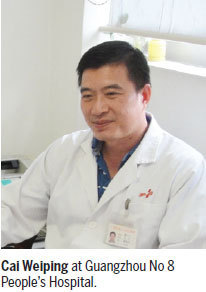Doctor Cai Weiping, who has treated an estimated 20,000 patients, aims to dispel myths about the virus
Though many on the Chinese mainland might balk at the thought of it, Cai Weiping publicly acknowledges that he has hundreds of friends who are HIV-positive or have AIDS.
Cai is director of the infectious diseases department at Guangzhou No 8 People's Hospital, a designated hospital to treat AIDS and other infectious diseases in the capital of Guangdong province.
He is so dedicated to his role that he often gives his personal mobile phone number to patients so they can contact him after hours.
"Now many AIDS friends regularly call me or contact me via WeChat and email to talk about the condition and other life issues," Cai said.
Last year, a young HIV-positive man even brought his girlfriend and her parents to meet Cai, so that they might better understand the illness.
The patient, who became infected when he was given a contaminated blood transfusion after a traffic accident, asked the doctor to help explain to his would-be parents-in-law that their daughter would not necessarily contract the illness if proper preventive measures were taken.

Cai and his wife regularly eat dinner with HIV-positive patients to dispel myths about the way the virus is spread and offer encouragement to the patients and their families.
He said this had helped to rebuild familial bonds in the past, showing parents that there was no reason to fear their children living with the infection.
The 55-year-old doctor estimates that he has treated more than 20,000 HIV/AIDS patients since he started working in the field in 1998.
"HIV is dreadful, but discrimination is even more dreadful," he said.
In addition to discrimination from their families, friends and colleagues, many people who are HIV-positive in Guangdong are also given the cold shoulder by hospitals and doctors, according to Cai.
He said such patients will often be transferred to his hospital as soon as the attending physician learns of the infection, as these doctors often claim their hospitals are not equipped to deal with HIV/AIDS.
"The hepatitis virus is actually more infectious than HIV, as it can be transmitted through more channels than HIV, which is spread primarily by unprotected sex, contaminated blood transfusions and mother-to-child transmission," said Cai, adding that all hospitals that can handle hepatitis patients are capable of treating people with HIV/AIDS.
To better serve patients, Cai's hospital has now built a dedicated delivery room and operating theater where HIV-positive women can give birth or undergo other surgical operations.
He has also drawn up a list of "red surgeons" who have agreed to help perform operations on HIV-positive and AIDS patients, because few doctors wish to be publicly associated with caring for them.
According to Cai, about 30-40 HIV-positive women give birth via Caesarean section in his hospital every year.
Cai always encourages his patients to date, marry and even give birth, because an HIV-positive husband can have a healthy child with a wife who is not infected, for example.
"The wives can become pregnant and deliver a healthy baby via artificial insemination after the viruses in the seminal fluid are killed," Cai said.
Xiao Hua (assumed name), one of Cai's patients, described the doctor as "loving" with "superior skills".
"Cai always works very carefully and usually becomes a friend of his patents after he sees them," she said.
UK charity Barry and Martin's Trust presented its eponymous prize to Cai in 2012 for his work in HIV/AIDS prevention and care. The trust, which supports hospitals treating HIV/AIDS patients throughout China, created the annual prize for excellence in AIDS education, prevention and care in 2000.
